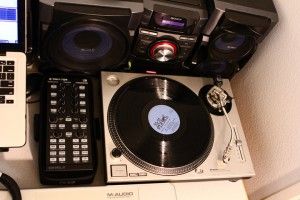Coming from the electronic music genre, dubstep’s older twice-removed cousin House Music, has a long history of experimentation that has brought it to the mainstream. With current popular DJs like David Guetta and Avicii, House Music has established itself as a club staple.
A genre that encompasses many subgenres, the original House Music was born in Chicago during the early ’80s. A descendant of disco, the underground scene welcomed a deeper more synthesized sound with one intention — to bring people together and make them dance.
The underground culture welcomed people of all races and sexual orientation, which attributed to their popularity. Two nightclubs in particular, The Warehouse in Chicago and Paradise Garage in New York, were pivotal to the origins of what later became House and Garage.

The style in New York was more down-tempo, which then went on to become a founding pillar for dubstep, while the style in Chicago was more upbeat, giving birth to House Music.
DJ Frankie Knuckles set the stage for House Music during his days at The Warehouse, which was primarily visited by black men looking to dance to disco. Around the time that Knuckles left The Warehouse, DJ Ron Hardy, a key player in the gay club scene, arrived at The Music Box. Hardy’s raw rhythms became the signature of House Music and transformed the Chicago sound, making The Music Box an inspirational place for DJs and producers.
For most DJs during this time, the goal was to create music that people would dance to at clubs and parties, leaving records aside. However, without radio, House music would never have gained such massive popularity. In order to bring their sound to a wider public, DJs began to play late-night sets on the radio station WBMX, so that even those who would have never stepped inside a club could hear their music.
As the House movement gained momentum, it began to branch out. Subgenres such as deep house and acid emerged through different musical influences.
In New York and New Jersey, the music heard in clubs could retrace its origins to R&B, with a greater emphasis on soulful instrumentals and vocals. Combined with the electronic drum sound, this style eventually became known as deep house. The New York and New Jersey sound led to a transformation that focused on the actual song itself.
On the other hand, DJ collaboration Phuture and Ron Hardy were playing with a Roland TB-303 bassline machine. The squelching noises combined with a deep repetitive drum sound led to Acid House.
These are just two examples of the many different subgenres that broke out of the original sound in Chicago. House Music even snuck into the top pop charts in the late ’80s and early ’90s with artists like Madonna (“Express Yourself”) and C+C Music Factory (“Gonna Make You Sweat”).
The ’90s continued to be a time of experimentation and the development of new sounds and subgenres. In fact, in 1991 DJ Justin Berkmann created a nightclub solely devoted to the House movement – London’s Ministry of Sound. This club went on to not only become an international symbol of electronic music, but also a brand of music labels that include annual compilations of EDM hits. 
At the end of the ’90s the influential and widely popular progressive House emerged with artists including Daft Punk and Basement Jaxx.
The 2000’s saw the development of Progressive House to the extent that it became the most predominant subgenre in the popular club scene. With the rise of the subgenre came the rise of DJs like Swedish House Mafia, deadmau5 and Afrojack.
House is still bumping in clubs all around the world. From artists like Ron Hardy to Avicii, what has remained prevalent is the deep rhythmic 4 by 4 sound. Its continual evolution has allowed it to stay at the front of club culture and make it one of the most recognized and popular dance genres of the world.
House Music Playlist:
Ron Hardy — “Trax A (Frankie Knuckles Remix)”
Nightwriters — “Let the Music Use You”
Phuture — “Acid Trax”
Daft Punk — “Alive”
Basement Jaxx — “Where’s Your Head At?”
David Guetta ft. JD Davis — “In Love With Myself”
Swedish House Mafia — “One”
Avicii — “Levels”

